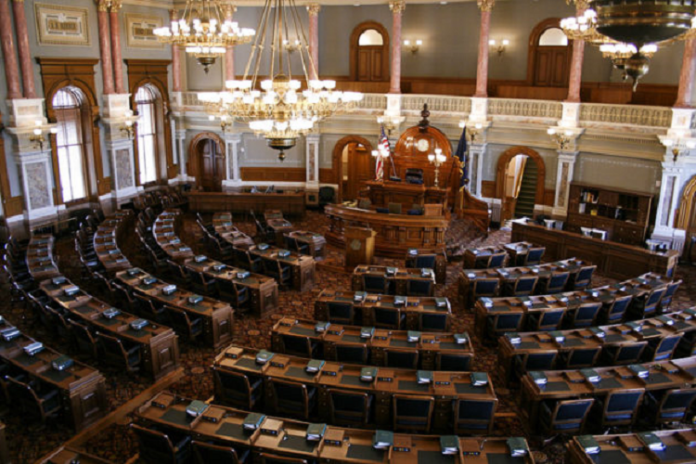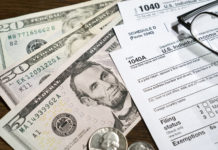The Kansas House early Saturday morning rejected a multipronged tax bill mixing property tax breaks for veterans and seniors with more controversial provisions including one that gives tax breaks to businesses that compete against government.
A bipartisan House voted to return the bill to a conference committee hours after the Senate failed to undertake a similar motion Friday.
The bill packaged the government competition measure with several more popular provisions such as a property tax refund for veterans and expanded property tax benefits for seniors.
It also exempted certain types of property such as snowmobiles, all-terrain vehicles, recreational off-highway vehicles and golf cart from property taxes.
But the bill also included a component that lawmkers said addressed how big box stores are appraised and whether they can be valued as if they are vacant – known as the “dark store theory.”
Lawmakers in the Senate and the House complained that veterans and seniors were used as bait to gain support for fitness club owners and big box retailers.
The House sent it back to a conference committee with the idea that the provisions related to veterans and seniors could be returned in a separate bill.
“As a veteran, I’m insulted that we are being put in a position to vote against our fellow veterans,” said Republican state Rep. Bill Clifford of Garden City.
“The dark store bill and the government competition bill do not belong in this legislation,” Clifford said. “We’re not here to cynically vote for things so that bad things can happen.”
Republican state Rep. Jim Minnix of Scott City called the bill an “insult” to the House.
As the daughter of a Navy veteran and the wife of a Vietnam veteran, Democratic state Rep. Cindy Neighbor of Shawnee called for sending the bill back to committee.
“I am saddened that we would even attempt to do this and degrade our veterans against dark stores and gyms,” Neighbor said of how the bill was packaged.
Early in the day Friday, there was an effort in the Senate to send the bill back to a conference committee to sort out the more popular provisions from something more controversial like the government competition provision that has been vetoed before.
The effort to send it back to a conference committee failed on a 19-20 vote. The bill passed on a 23-14 vote with two senators present and passing.
The tax bill revisits a decade-old debate in the Legislature over whether local governments are competing against the private sector when they open community centers that offer similar services to private health clubs at a less expensive rate.
“The truth is government shouldn’t compete,” said Senate President Ty Masterson.
“I’m proud to stand with that provision. I know certain people try to make it about certain people. But this is really about competition,” he said.
The Legislature has been trying to address the issue of government competition against the private sector for years, starting as early as 2013 and 2014 when private health club owner Rodney Steven unsuccessfully pushed legislation to tax nonprofit health clubs like YMCAs.
The health clubs, led by Steven, have argued that they are increasingly facing competition from nonprofit and municipally owned gyms that don’t have the burden of paying taxes.
They claimed that local governments had spent more than $100 million in the last 15 years on “gigantic facilities,” causing private competitors to close although it was revealed at one point that Steven’s fitness businesses owed more than half a million in property taxes.
State auditors studied the issue and weren’t able to reach any conclusions about whether tax exemptions give governments and nonprofits a competitive edge over for-profit businesses offering similar services in the private sector.
Auditors said their efforts were complicated by a lack of available new research on the issue as well as their inability to look deeper into private sector businesses to determine whether governments and other nonprofits had a competitive advantage.
“Although government, non-profit, and for-profit businesses may appear to compete, the research indicates that true competition may be limited, at best,” the audit said.
“Further, while government and non-profit tax and exemption status might offer an advantage over for-profit business, the issue has not been well-studied.
“Unfortunately, existing tax data in Kansas is not precise enough for us to reliably quantify the specific effect of tax or exemption differences.”
In the past, the government competition proposal drew fierce opposition because it was believed to be tailored to help Steven – a frequent campaign contributor – and Genesis Health Clubs.
Businesses – limited to child care centers, health clubs and restaurants – would qualify for a property tax exemption if they faced government competition.
The bill defined competition as offering the same or substantially the same goods or services to the public at least half the number of days each year as the business claiming the exemption.
The business must be located in cities where a facility owned or operated by the government competes against a similar private business or within five miles.
The exemption would only be granted if the government started competing against the business after it had already been running.
While the bill would make available the exemptions available starting in 2025, critics said the bill was unclear.
They feared business could go back years and claim unfair competition for a tax exemption going forward.
Lawmakers said eligibility is retroactive but a business could not go back in time to get property tax refunds from years past.
The government competition measure opened a debate on the Senate floor over whether the bill should be sent back to committee where more politically friendly parts of the bill could be separated and sent back for a vote.
Some senators noted that the bill included tax refunds for veterans and expanded tax benefits for seniors that made the bill more palatable.
They said they should have a chance to vote on the better parts of the tax bill without having to support controversial provisions that would likely draw a veto.
“I think we shouldn’t be using our veterans as bait,” said Democratic state Sen. Jeff Pittman of Leavenworth.
“I know that seems like a strong word, but to sweeten the pot for us to vote for these other things that we might or not agree with – I don’t feel like it’s fair.
“I feel like we should have a clean vote on the veterans bill and the homestead act instead of bundling this together,” Pittman said.
Republican state Sen. Jeff Longbine of Emporia wanted to sent the bill back to conference committee in an effort to pass the best parts of the bill.
Longbine said if the more objectionable parts of the bill were removed – namely the government competition provision – the bill legislation would pass easily.
“Without this motion passing, this body can either vote it down, which kills all the provisions in it…or we can send it on to the governor and she’s very likely to do what she did last year and kill all of it again,” Longbine said,
Republican state Sen. Caryn Tyson, chair of the Senate tax committee, said it was a good bill although not perfect.
Tyson said the so-called “negative” parts of the bill have passed the chamber previously. She said lawmakers should not make decisions based on what the governor might do.
“We pass many things in there that do not have a veto-proof majority,” she said.
“That is not what we need to do for our constituents is worry about what the governor is going to veto or not veto,” she said.
“We are giving one person the ability to stop us on great legislation.”
















